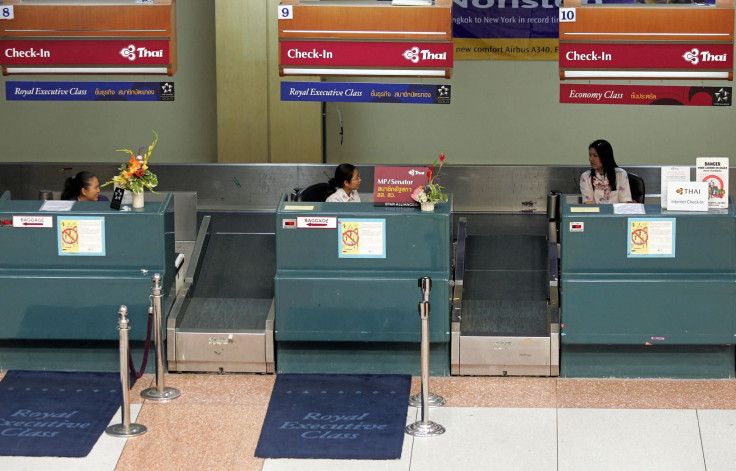Coronavirus Outbreak: Virus Decimating Thailand’s Key Tourism Sector

KEY POINTS
Thai tourism officials expect the number of visitors to drop by 50% in first half of the year
Some 28% of tourist to Thailand hail for China
Tourism accounts for about 20% of Thai GDP.
The coronavirus outbreak in China and East Asia has dampened prospects for Thailand’s key tourism industry – a sector that depends heavily upon Chinese travelers. Making matters worse, China banned all group travel excursions – a major element of Thailand’s tourism growth -- about a month ago.
Phiphat Ratchakitprakarn, Thailand’s Minister of Tourism and Sports, said he expects tourist arrivals to drop by 50% in the first half of 2020.
The 50% plunge means overall tourist arrivals are expected to fall to 20 million from 40 million for the year.
While the Thai government plans to offer the beleaguered tourist sector soft loans and tax incentives to help them weather this slowdown, the plunge in tourists will likely damage the livelihood of millions of people whose jobs are tied to tourism.
“Relief measures are needed to take care of tourism operators, and each state agency has been tasked with proposing measures to the cabinet that should be rolled out by March,” said Deputy Prime Minister Somkid Jatusripitak. “The impact of the deadly virus on tourism is adverse and the government is concerned because the sector makes up a significant portion of the economy.”
Phiphat reported that during the Feb. 1-9 period, overall tourist arrivals dropped by 43.5% -- among Chinese visitors, the decline was 86.6%.
“We expect the situation to pick up in April and will be discussing with airports of Thailand ways to manage flight schedules for Chinese tourists to reduce airport congestion. So we want to put the priority on tourist safety,” he said. “The Tourism Authority of Thailand will need to work harder in the second half to compensate for the first [half].”
One of Thailand’s most popular tourist destinations, Phuket, has already witnessed a significant reduction in business.
“Dramatic overnight drop in new bookings with cancellations piling up until the end of February, and not much movement in March,” said a hotelier in Phuket. “[There has been a] continuation of cancellations including guests traveling via China or other so-called ‘affected’ countries. MICE market [Meetings, Incentives, Conferences Exhibitions] came to a complete stop and weddings postponed until mid-year for the time being. Inquiries completely dried up. Resorts and hotels are looking at cutting costs as much as they can immediately. Complete stop on new [hiring] unless absolutely necessary, and close entire resort buildings to reduce operating costs.”
As of February 17, hotel occupancy rates in Phuket were at the mid-50% level, and these figures have likely fallen since then.
Phuket International Airport saw a 37.5% plunge in arrivals for the month of February through Tuesday, while Bangkok’s Suvarnabhumi Airport witnessed a 45.2% drop. (Many travelers who fly to Phuket usually first stop at Suvarnabhumi)
In another popular tourist spot, Chiang Mai in the north, prospects are equally bleak.
“The last month has been desperately quiet and that was on top of a major slump for the last six months,” said a hotel operator in Chiang Mai. “Our forward bookings situation is looking very [poor] and many of our peer businesses are making quick changes and even [laying] off staff to try and minimize the impact on the bottom line.”
Chiang Mai’s airport normally saw 5,000-6,000 Chinese tourists arriving daily – now there are less than 100 trickling through.
Some 28% of visitors to Thailand came from China last year. Tourism income typically represents about 20% of the Thai economy.
Thailand itself now has at least 40 confirmed cases of coronavirus.
The gloomy outlook for tourism has depressed Thai stocks as well. On Wednesday, Thailand’s SET Index plunged 5.1%, bringing the year-to-date decline to 14%.
“Fundamentals and valuations are irrelevant now as the market is overwhelmed by fear,” said Namchai Techaratanawiroj, the head of research at LH Securities Co. in Bangkok. “Tourism is a key economic driver and Chinese tourists are the big spenders. There is still no end of this outbreak in sight.”
Thailand’s National Economic and Social Development Council reduced its economic growth forecast to a range of 1.5%-2.5% for this year, down from a prior estimate of 2.7%-3.7%. Gross domestic product expanded by 2.4% in 2019, the lowest rate in five years.
© Copyright IBTimes 2025. All rights reserved.




















